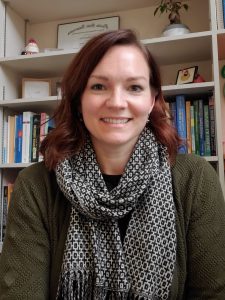Welcome to the second issue of CSD Research Briefs! Every semester, we will share summaries of our academic and clinical faculty members’ latest projects, publications, and presentations related to audiology and speech-language pathology. The CSD Research Briefs can serve as a valuable resource for students, clinicians, caregivers, researchers, and other professionals. In this issue, Dr. Antony Joseph, Dr. Jamie Mahurin-Smith, Dr. Ciera Lorio, Dr. Shraddha Shende, Dr. Jean Sawyer, and Dr. Heidi Verticchio share their publications and presentations from May-August 2023. Links to each publication are provided so our readers can learn more. Please feel free to reach out to our faculty members if you would like a copy of the article or have any questions.
For two terms, Dr. Antony Joseph served as the Chair of the Audiology Academy, which is one of 15 in the National Academies of Practice (NAP). The NAP is the only interdisciplinary group of health care practitioners that focuses on informing the U.S. government about our healthcare system. Dr. Joseph collaborated with two of his colleagues (also audiologists and NAP leaders) to describe how to improve patient care through person-centered public policies, scholarship, and interprofessional collaboration. His article discusses how the NAP allows its members to learn directly from other medical sub-specialties and how various diseases, injuries, and conditions call for collaborative and coordinated care. An alignment of the health care system and audiology is presented. For several years, Dr. Joseph has collaborated with leaders from Nursing, Social Work, and other health educators on campus to develop interprofessional experiences for ISU Doctor of Audiology students.
Breastfeeding problems are commonplace and can be a key factor preventing families from meeting their breastfeeding goals. Dr. Jamie Mahurin-Smith collected data on breastfeeding problems from 535 participants. This paper describes the patterns of problems that are most likely to co-occur, and the problems that are most often associated with maternal distress and postpartum mental health challenges.
Dr. Jamie Mahurin-Smith & Dr. Ciera Lorio
Many families find the transition from early intervention services (EI; for children ages 0-3 years) to early childhood special education services (ECSE; for children 3-5 years) to be highly stressful. Some families receive more support than others during this transition process, and Drs. Jamie Mahurin-Smith and Ciera Lorio aimed to explore a structured transition class that was designed to provide this type of explicit support to families. They found that children who participated in a structured transition class demonstrated significant changes in their tolerance for separation from caregivers and their participation in class activities over time. This paper discusses how participation in specific transition class prior to transitioning to an early childhood special education program may support young children in developing the skills they need to be successful in preschool classroom setting.
Age-related hearing loss (ARHL) is currently a public health concern with increasing evidence suggesting that ARHL is a modifiable risk factor for cognitive impairment. Previous studies have shown that cognitive challenges are noted even in those with mild severity of ARHL, particularly in the domain of cognitive control, an ability that allows us to perform everyday activities with ease. Dr. Shende collaborated with Dr. Raksha Mudar at University of Illinois to review the evidence on cognitive control challenges experienced by older adults with ARHL. Her article synthesizes and discusses the various findings related to cognitive changes in individuals with ARHL, including long-term cognitive changes observed in this population. The article also provides recommendations for future work in this area. Dr. Shende continues to publish in the area of cognitive hearing science.
Speech-language pathologists sometimes resort to transcribing stuttered speech if they are conducting an evaluation. Dr. Sawyer’s research, which was published in the conference proceedings for the Joint World Congress on Stuttering and Cluttering, explores a non-transcript-based method of characterizing stuttered speech. The participant was a graduate student who used a tally-based method. Her results were compared against a transcript, and it was found that severity ratings of the tally-based method were the same as the transcription method. This research provides evidence for using a less time-consuming method of characterizing stuttered speech.
Dr. Verticchio and her colleague gave an invited presentation for the Greater New York Council of Academic Clinical Educators in Communication Sciences and Disorders. The title of this presentation was Wellbeing and Graduate Student Mental Health. This six-hour presentation began by providing definitions and statistics of negative (stress, anxiety, depression, and perfectionism) and positive (mindfulness, self-compassion, gratitude, and self-care) constructs associated with mental health and wellbeing (MHWB). This interactive virtual presentation then focused on providing clinical educators with current research related to the constructs of MHWB. Specific tools and resources to support the MHWB of students and clinical educators were introduced, discussed, and practiced.







